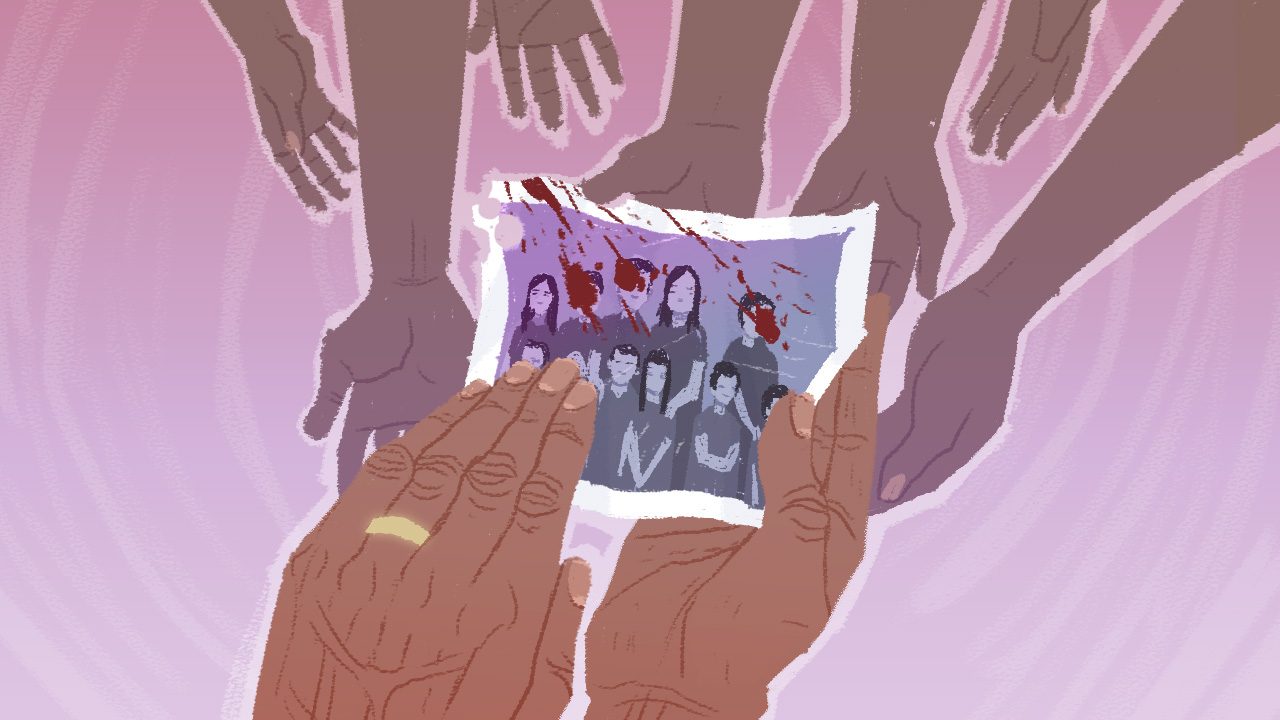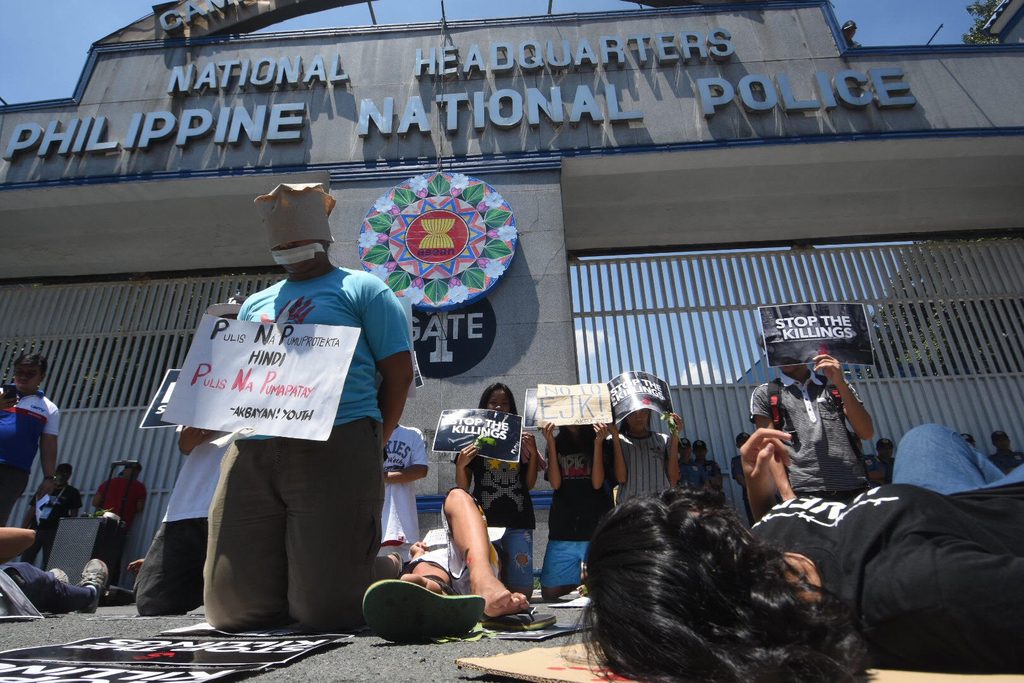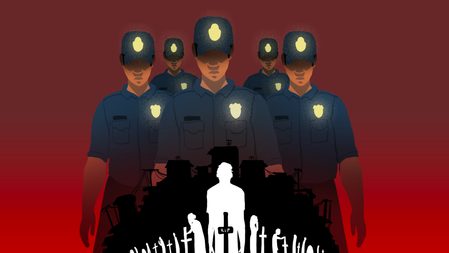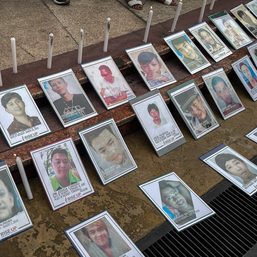SUMMARY
This is AI generated summarization, which may have errors. For context, always refer to the full article.

Editor’s Note: Rodrigo Duterte’s violent war on drugs mostly targeted men living in poorest communities across the Philippines. At least 6,252 people were killed in police operations between July 1, 2016 and May 31, 2022, not including victims of vigilante-style killings. This means that Duterte’s flagship project also resulted in thousands of grieving families, including widows and mothers, who are left to balance the role of being homemakers and breadwinners. To mark Mother’s Day on May 14, Rappler speaks to three people to revisit their stories and to know how they navigate their grief following the traumatizing incidents. This series features a mother who lost her son, a widow who lost three loved ones in one night, and a daughter who misses her mother’s guiding light as she raises her own child.
PART 1 | Not losing hope: Mother of drug war victim finds courage in helping other grieving families
Second of 3 parts
MANILA, Philippines – The house with its imposing perimeter walls has stood witness to the many milestones in Judy’s* life over the past four decades.
Her family first moved to this northern Metro Manila community in the early 1980s. The house was much smaller back then, Judy recalled to Rappler in an interview, but it meant the world for her 10-year-old self. The walls knew all her secrets, the rooms listened to her coming-of-age stories.
Judy built her life as a mother around the house. Her husband moved in, and they had their only child not long after. The family grew as years went by, with a son-in-law and two grandchildren when her daughter got married. Judy’s brother also lived with them.
The house was their safe space, along with the community it was part of. Families knew each other, especially Judy who had spent most of her life with their neighbors. She herself worked for the local barangay (village) for many years.
Life was not perfect but it was enough, especially compared to the rest of the poorest communities in Metro Manila. The men in Judy’s family had stable jobs that enabled them to eat three times a day and still had money to pay for other basic necessities. When times got rough, they knew they had each other to cover whatever was lacking.
But that was almost four years ago. One early morning in March 2019 changed Judy’s life as she knew it. The night prior was normal, nothing out of the ordinary. They had their usual snack of buko pie they brought from the neighborhood bakery, and they talked about their days.
A few hours after midnight, the family was roused from deep sleep as men in civilian clothing forced their way into the house and their rooms. Judy could not remember how many they were, but several of them wore bonnets. The image that stuck, however, was the big and long guns the men carried and shoved to their faces.
“Tumayo ako at tinanong ko kung anong problema, sino ba ang hinahanap nila, at kung may warrant of arrest ba sila, pero wala silang sinabi at inutusan lang kaming dumapa,” Judy said.
(I stood and asked them what’s the problem, who they were looking for, and if they had an arrest warrant. They didn’t say anything but just ordered us to drop to the floor.)
The women in the family and their children were pushed into a room, while the men were ordered to stay put. Judy said she heard her brother, the one who works as a messenger, pleading to the men that he’s a good guy and is not involved in anything illegal.
Then there were gunshots, but Judy was sure her family did not own any guns. She wanted to go out and check on her husband of 30 years, but they were trapped and were threatened not to move.
“Sunod-sunod na ang putok at nag-iiyak na lamang kami kasi wala kaming magawa (The gunshots were in succession, we just cried because we couldn’t do anything),” she said.
Judy couldn’t recall how long the ordeal was. She remembers, however, the agonizing silence that followed the succession of gunshots. She remembers the warm light of dawn that seeped into the room when a man opened the door, before they were ordered to put towels on their heads.
The children were let out of the house first, and then the women. They were sternly told not to look anywhere else. Judy still did, only to see her brother bloodied and lifeless on the floor.
The family was distraught and in hysterics when a team from the scene of the crime operations arrived. Judy and her daughter were barred from going back inside the house to see the extent of the damage. They only saw their loved ones already in the funeral parlor, the images forever burned in their memories.
“Ang daming tama ng asawa ko at ang kapatid kong lalaki, bali ang hita pati ang braso kasi tinadtad nila ng bala habang ang manugang ko sabog ang bunganga at biyak ang mukha,” she recalled. “Torture talaga ang ginawa nila sa aming lahat.”
(My husband had a lot of gunshot wounds, and my brother’s arm and leg were broken because they really riddled him with bullets. My son-in-law’s mouth and face were shattered by the bullets too.)

‘Why did this happen to us?’
What happened to Judy’s family that night mirrors several other incidents across the Philippines since Duterte was elected and sworn into the presidency in 2016. He promised to rid the country of crime, including illegal drugs, and that he would do this even if he had to kill.
When his term ended in June 2022, there was little to no proof that he indeed was effective in ridding the country of illegal drugs. They continue to proliferate to this day. What he left, however, was a trail of blood that would haunt thousands of families their whole lives.
The three men in Judy’s family joined the thousands of Filipinos killed under Rodrigo Duterte’s violent war on drugs. By the end of March 2019, at least 5,375 people were already killed by police. This number ballooned to at least 6,252 people by May 31, 2022, a month before his term ended.
This death toll, however, does not include victims of vigilante-style killings, or those who were gunned down by unidentified men or whose bodies were found wrapped in garbage bags. Human rights groups estimate the total killed to reach at least 30,000.
People were not just killed on the streets but also inside their homes, supposed to be safe spaces but transformed to killing fields under Duterte. Many of them prior to their deaths were included in a list of suspected drug personalities strung together based on unverified information.
Judy still doesn’t know the real reason why her family was targeted that night. They were told that her loved ones were involved in illegal activities, a claim that she disputed. Judy has been with her husband for three decades, and her daughter and son-in-law had been together for almost a decade. They never kept secrets from one another.
“Wala kaming alam kung bakit nila ginawa sa amin,” she said. “Masaya kaming pamilya, wala kaming kaaway, kaya ang sakit-sakit sa loob nitong nangyari, sobrang sakit.”
(We don’t know why it happened to us. We were a happy family. We have no enemies. That’s why it’s so painful.)
Going to the police was not an option because Judy and her family believed they were the ones behind the killing. They remained so fearful in the aftermath of the incident, so scared that they had to ask other people to process necessary reports related to the deaths of their loved ones.
Judy and her surviving relatives did not stay long in the house where the three men were killed. Aside from the bad memories, they worried that the men would come back and finish off their entire family. They felt threatened in the very community they lived in their entire lives.
“May mga bahid pa po ng dugo ang mga kuwarto, ang mga higaan namin sira-sira, ang mga dingding puro tama ng bala,” Judy said. “Puro mga masasamang alaala ang nandoon kaya hindi na namin kaya pa tumira.”
(There were still traces of blood in the rooms, our beds were destroyed, and the walls had bullet holes. All that was left were bad memories so we couldn’t stay any longer.)

Staying strong for grandchildren
It has been three years since Judy and her family left their home to relocate two hours outside of Metro Manila. In leaving the Philippine capital, they also left their sources of livelihood.
Life was easy for the family before that night in March 2019. Income was consistent and they never had to worry about what tomorrow could bring. They would pool their resources together when due dates arrived.
These days, however, Judy could barely make both ends meet. A stable job was hard to come by in the place where they moved to, especially for someone of Judy’s age. Unlike in Metro Manila where it was easy to find seasonal work, the family had to rely on the charity of Judy’s other siblings.
“Kahit na sabihin mo na grabe kami magtrabaho ngayon, kulang na kulang pa rin ang pang-araw-araw namin kasi lumalaki na ang mga bata, lumalaki na rin ang gastos,” she said.
(Even if we work so hard, we still do not earn enough for our daily sustenance. As the children grow older, so do the expenses.)
The surviving family members earn approximately P10,000 ($180) a month to cover expenses. They do not own the house they live in, so they have to pay about P4,000 ($72) for rent. That brings down their monthly budget to P6,000 ($108) for seven people.
Judy admits that life has turned out for the worse after her husband, brother, and son-in-law were killed. She feels bad for her grandchildren who were so young when the killings happened and who now often ask where their father is. They just tell them he’s in heaven with Jesus.
But Judy knows that they cannot forever drown in sadness and grief. The family often attends church services and undergoes counseling to ease their trauma. They also sometimes gather with other families of drug war victims to discuss what they are going through.
“Para na lamang sa mga apo ko kaya ako nagpapakatibay at lumalaban (I try to fight and remain strong for my grandchildren),” Judy said.
No moving on
The families also talk about the challenges they face in finding justice for their loved ones. They know all too well that justice in the Philippines feels like an impossible dream.
These are not unfounded claims, as one of three drug war cases led to convictions, including the policemen involved in the killing of 17-year-old Kian delos Santos, Carl Angelo Arnaiz, and Reynaldo “Kulot” de Guzman.
But there are also others who have advised them to move on, to forget what happened, and to stop blaming the previous administration.
“Hindi puwede mag-move on na lamang na walang katarungan, kailangan ilaban,” Judy said.
“Hindi mo naman basta-basta makakalimutan ang nangyari, kung nakita lang nila iyong itsura ng mga kaanak namin, na bali-bali ang katawan, hindi nila maaalis sa isip nila ‘yon,” she added.
(We cannot just move on without justice. We have to fight for it. You cannot just forget what happened. Maybe if they saw how our loved ones who were killed looked like, how parts of their bodies were broken or destroyed, they wouldn’t be able to forget.)
What brings them a sliver of hope is the International Criminal Court (ICC), an independent body that is currently investigating Duterte’s violent war on drugs and the killings that came with it.
But the Philippine government has consistently opposed moves by the court. It appealed the recent decision of the ICC’s pre-trial chamber to allow Prosecutor Karim Khan to reopen his probe. Several lawmakers also filed resolutions urging Congress to declare “unequivocal defense” of the former president, the man known to have ordered the bloody slaughter.
Since the night that killed three of her family members, Judy stopped watching the nightly news. She couldn’t bear hearing how what happened to her husband, son-in-law, and brother continue to be replicated in various parts of the country. But one day in January 2023, she turned on the TV to see news about a recent ICC development, and Chief Presidential Legal Counsel Juan Ponce Enrile reacting against it. Judy wanted to scream at the television screen.
Hearing how President Ferdinand Marcos Jr. and his administration continue to protect Duterte from the ICC brings nothing but painful memories for Judy.
If it weren’t for Duterte, she said, her brother would’ve continued working to realize his dreams. If Duterte had not ordered the killings, her daughter wouldn’t become a widow so early in her life. If the former Davao City mayor had not been elected president, Judy would still have had her husband of 30 years by her side. Maybe they would even be able to celebrate their 50th year together.
The house that spent almost her whole life in, whose walls witnessed the happiest and worst days of their lives as a family, is now home to strangers.
“Kung hindi sila pinatay, nandoon pa kami sa bahay na iyon kasi nandoon ang trabaho namin, doon na ako lumaki, doon na ako nagkapamilya, doon namulat ang anak ko,” Judy said.
“Hindi naman kami aalis kung hindi sobrang sakit ang naramdaman namin, mas masaya po kami sa lugar na iyon.”
(If they weren’t killed, we would still be there because we worked there, I grew up there, I had my family there. It’s where my child grew up too. We wouldn’t have left if we didn’t feel so much pain. We were so much happier there.) (To be concluded) – Rappler.com:
NEXT: Drug war victim’s daughter: I miss my mother’s guiding light
*Names have been changed for their protection.
Add a comment
How does this make you feel?



![[The Slingshot] Lito Patay’s 4 hours and 38 minutes of infamy](https://www.rappler.com/tachyon/2024/07/Lito-Patay-4-hours-infamy-July-19-2024.jpg?resize=257%2C257&crop=233px%2C0px%2C720px%2C720px)

![[The Slingshot] A Duterte and Bato cop named Patay](https://www.rappler.com/tachyon/2024/06/tl-lito-patay.jpg?resize=257%2C257&crop=322px%2C0px%2C720px%2C720px)



![[EDITORIAL] Sorry Arnie Teves, walang golf sa kulungan](https://www.rappler.com/tachyon/2024/03/animated-arnie-teves-arrest-carousel.jpg?resize=257%2C257&crop=310px%2C0px%2C720px%2C720px)






![[OPINION] Rodrigo Duterte and his ‘unconditional love’ for China](https://www.rappler.com/tachyon/2024/04/rodrigo-duterte-xi-jinping-august-2019.jpeg?resize=257%2C257&crop=91px%2C0px%2C900px%2C900px)


There are no comments yet. Add your comment to start the conversation.